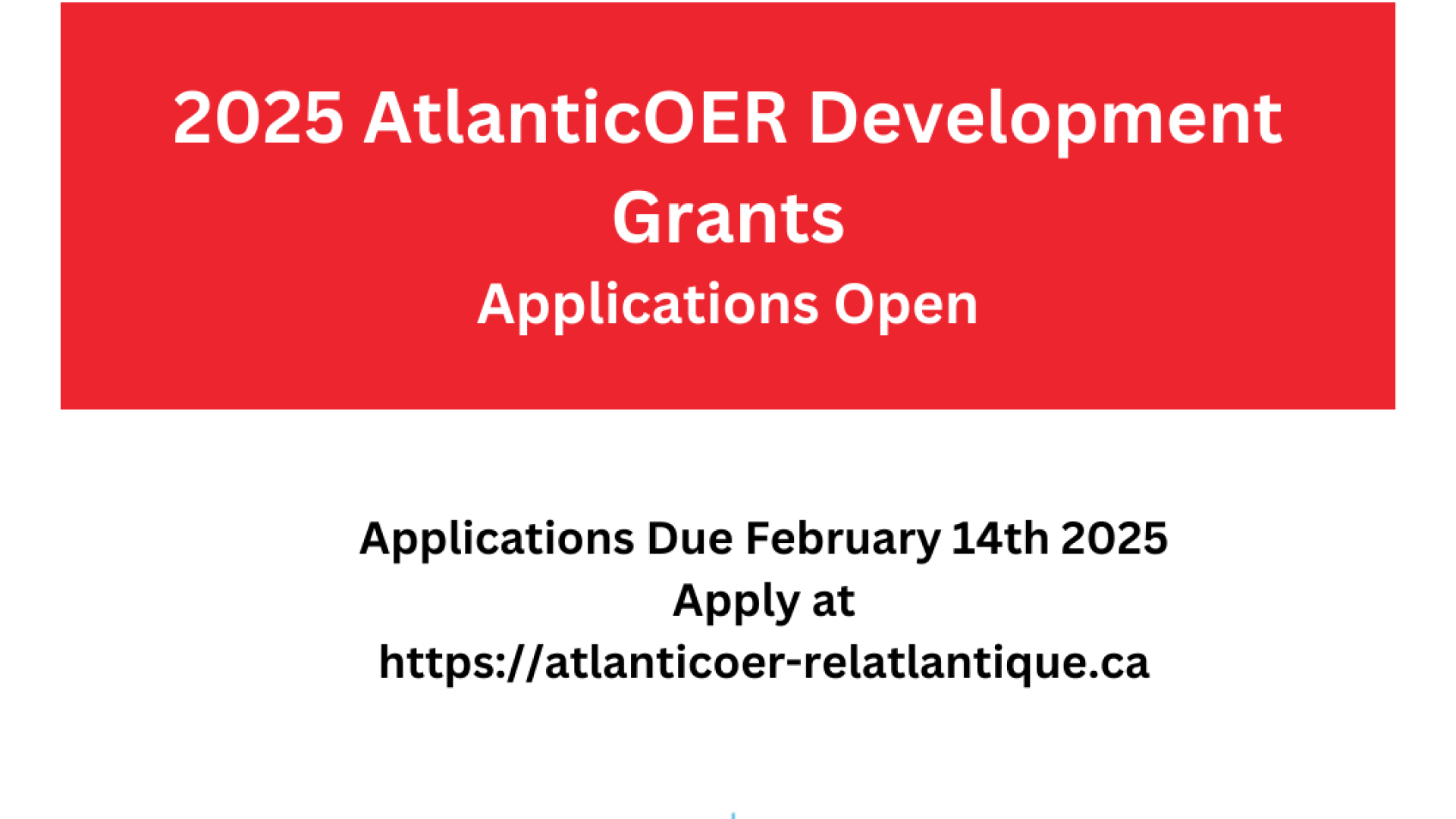
Call For Applications
The Council of Atlantic Academic Libraries is sending out a call for applications for the AtlanticOER Development Grants. Funding is provided by the four Atlantic provinces (New Brunswick, Newfoundland, Nova Scotia, and Prince Edward Island).
What are Development Grants?
AtlanticOER Development Grants are intended to provide financial support to instructors in the Atlantic Region with the process of creating and adapting new Open Educational Resources. Our goal is to support instructors to increase the availability of quality, free, openly licensed resources to support student learning.
There are three different tiers of funding that you can apply for, depending on the scope of the project. The tiers are as follows:
Tier 1: Creating an Open Textbook (up to $7,000)
This funding is intended for the development of a new open textbook. The topic should not be covered in an already existing open textbook. This tier is meant for creation projects at a larger scale.
Tier 2: Adaptation of an Existing Open Textbook (up to $4,000)
This funding is intended for substantive adaptation projects. Sometimes, it can be possible to find an open textbook that covers foundational knowledge, but which needs to be adjusted. For example, the textbook might need adjustments to ensure it adheres to local educational standards, adjustments might be made to make it relevant to the local context (eg, an American business textbook may need adjustments to make it suitable for a Canadian business context), or new examples and interactive elements may be added to a book.
Tier 3: Creation of Ancillary Materials (up to $1,000)
This funding is intended for smaller creation projects. Ancillary materials can be defined as course materials that are meant to supplement and support a textbook. Examples of ancillary materials include: slide decks, interactive tutorials, and quiz and test banks. Often, ancillary materials can enhance student learning.
Who Can Apply?
Applications are open to individuals who are affiliated with a CAAL-CBPA member institution. In the case where an application is being submitted by a team, at least one team member must be affiliated with the member institution. The proposed OER must be intended for a credit bearing course at the member institution and at least one applicant must be affiliated with the course.
What Can Funding be Used For?
Funding can be used for the following activities:
Support: funding can be used to financially support the hiring of another individual, such as an undergraduate research assistant, to assist with the project. Activities may include support uploading content into a Pressbook, technical expertise, support with designing any graphics that may be required.
Events: funding can be used to finance events, such as sprints, that are used to generate the content for an OER. The funding can also be used to finance resources for the events such as facilities and refreshments.
Funding cannot be used to pay the instructor for their work on the project nor can it be used to fund any administrative overhead. As part of the application, you will be asked to outline your expenses and a rationale for each expense.
Application Requirements
A description of the proposed OER and the gaps that exist in already-existing openly licensed materials on the same subject.
Detailed assessment of the costs, including an itemized list of expenses along with a description of each expense.
A detailed timeline for the project, including milestones.
An assessment of the potential impact of the project on student experience and learning. Impact should include projected student savings.
A plan for maintaining the currency and relevancy after the end of the grant period.
Completion of required forms.
Applications can be submitted in either English or French. Applications submitted in French will be translated into English by the selection committee for the adjudication process.
Application Timeline
Applications are open starting on January 6th 2025. The application period will close on February 14th 2025. Review of the applications will start immediately thereafter. Successful applicants will be notified mid-March. At this time, successful applicants will be told which tier of funding they have qualified for and will be given a detailed document that outlines the expectations of grant recipients. Funds will be disbursed to the lead applicant’s institutional grant office or equivalent as a full lump sum in April.

